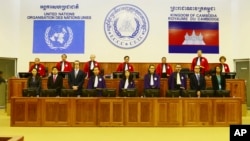Forty years ago, the Communist Party of Cambodia, known as the Khmer Rouge, seized power and began a horrific social engineering experiment that resulted in the deaths of an estimated 1.7 million people. Under the leadership of Pol Pot, Nuon Chea, Ieng Sary, Ieng Thirith, Son Sen and Khieu Samphan, the Khmer Rouge attempted to create a purely agrarian-based society by systematically slaughtering the intelligentsia and forcing much of the population into agricultural labor.
The Khmer Rouge ruled Cambodia from 1975 to 1979. But it took more than three decades, and the determined effort of Cambodians and of the international community to see justice done on behalf of the victims of the Khmer Rouge, before those responsible for one of the 20th century’s worst atrocities were called to account for their crimes. In 2006, a special United Nations-backed tribunal, the Extraordinary Chambers in the Courts of Cambodia, or ECCC, was convened, to prosecute the leadership of the Khmer Rouge.
By that time, Pol Pot and Son Sen were dead, Ieng Sary died before judgment could be reached at trial, and Ieng Thirith, who suffers from advanced Alzheimer’s disease, was found incompetent to stand trial. Thus it was Nuon Chea, the former Deputy Secretary of the Communist Party of Cambodia, and Khieu Samphan, the one-time President of the state that was then called Democratic Cambodia, that stood before the court when judgment was reached.
On August 6, both were sentenced to life in prison for crimes against humanity, murder, political persecution and other inhumane acts during the movement of the population out of urban centers, and murder and extermination through the execution of Khmer Republic officials at Tuol Po Chrey. They were also found guilty of planning, instigating, aiding and abetting the crimes of extermination, other inhumane acts in connection with the forced transfers, and political persecution. Additionally, Nuon Chea was found to have ordered these crimes.
The United States has long supported the goal of prosecuting those most responsible for the atrocities perpetrated by the Khmer Rouge regime. We must now help Cambodia’s people see the job through as they usher in a new era of justice, accountability, and reconciliation.
We welcome this historic verdict by the Extraordinary Chambers in the Courts of Cambodia, and continue to support the efforts of this court to secure justice and to shed light on the darkest chapter of Cambodian history.

















